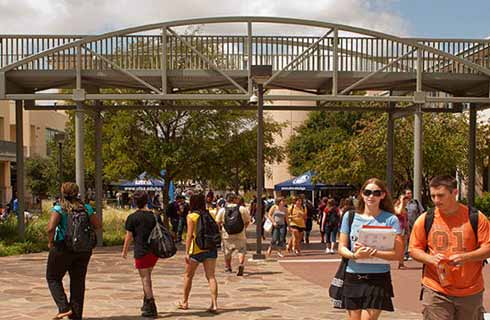教育学(荣誉)文学士学位-社会学
BA (Hons) Education Studies - Sociology

学历文凭
Bachelor Degree with Honours

专业院系
School of Education

开学时间

课程时长

课程学费

国际学生入学条件
IDP—雅思考试联合主办方

雅思考试总分
6.5
- 雅思总分:6.5
- 托福网考总分:80
- 托福笔试总分:
- 其他语言考试:Pearson Academic PTE - 62 (with no less than 59 in each Communicative Skill) Cambridge C2 Proficiency or C1 Advanced - 176 with a minimum of 169 per component
CRICOS代码: XL33
申请截止日期: 请与IDP联系 以获取详细信息。
课程简介
Education Studies is a broad multidisciplinary degree, designed for the intellectually and practically curious. If you are particularly fascinated by the social and sociological aspects of education, this is the course for you.,Are you interested in why people learn in different ways Do you want to find out more about barriers to learning and how learning supports childhood development Maybe you’d like to know more about the impact of society and social policy on the education experience. The BA Education Studies – Sociology is an ideal qualification if you are fascinated by the learning process from a sociological perspective and want to keep your career options open. From the philosophical foundations of schooling to the political implications of policy, education is a vast field that has multiple avenues to approach a seemingly straightforward subject. Our degree goes far beyond any classroom and considers education, people and their relationship to the ever-changing world. This BA will prepare you for a career in many different areas, both in the education sector and further afield. It can provide the first step towards a career as a teacher or researcher, and supports roles in publishing, policy making, the voluntary and public sectors, as well as many more. The curriculum draws on research carried out in the Department to keep the course content relevant and up to date. The breadth of modules allows you to create your own pathway through the course. As well as the sociology pathway, we offer pathways in psychology and geography, or you can choose to focus purely on education studies.Course structureYear 1 modulesCore modules:Historical and Philosophical Ideas of Education will introduce you to some of the major educational theorists and the foundational ideas informing education practice today. This will help you to develop a personal perspective on the longstanding debate about the purpose and value of education.Contemporary Issues and Evidence in Education examines a range of contemporary issues in education and the nature and scope of the supporting evidence. With a range of guest speakers from across the Department you will gain a grounding in a variety of issues at stake.Societies in Transition is the study of contemporary societies and aspects of social life and change, focusing on local communities, families and relationships, economies and consumerism, and patterns relating to health, social class, gender raceethnicity and religion.Classical Sociological Theory introduces sociological concepts and theorising, using individual thinkers and particular topics to illustrate changing understandings of the relationship between structure and agency in sociological thinking, both across time and in relation to current debates.Optional modules:In recent years, optional modules have included: Disability and Educational Needs: What’s so ‘Special’ about SENDInternational and Comparative EducationFoundations of Psychology in EducationYear 2 modulesCore modules:Educational Research Methods helps you to understand the purposes and implications of educational research. You will develop a critical appreciation of the different ways in which research can be carried out in education, and how to assess the quality of educational research.Modern and Contemporary Sociological Theory explores the key theoretical perspectives within sociological inquiry. You will develop the skills to assess and compare different theoretical perspectives in terms of consistency, logic and explanatory power.
相关申请
 预科
预科 奖学金
奖学金 实习机会
实习机会 在校学习
在校学习 跨境学习
跨境学习 校园授课-线上开始
校园授课-线上开始 在线/远程学习
在线/远程学习
开学时间&学费
学费信息仅供参考,请与IDP联系以获取详细信息
| 开学时间 | 时长 | 学费 | 地点 |
|---|
学校排名

世界排名114
数据源:
泰晤士高等教育世界大学排名
关于杜伦大学

杜伦大学创建于1832年,是英国历史最悠久的大学之一。杜伦大学建于中世纪世界遗产地旁,有着悠久的历史和现代价值观,是一座备受推崇并拥有前瞻性思维的学府。如今,来自世界各地的18000多名学生在达勒姆就读。杜伦大学有28个系,开设有200多门本科和研究生课程。该校很多教师都处于各自领域的最前沿。教职人员利用出色的研究和学科知识为所有学生提供优质的教学。目前,杜伦大学有17个学科在全球大学中名列前100位,其中九个学科名列前50位。除了在学术上的卓越成就,该校还努力为学生提供支持,帮助他们在毕业后获得有意义的工作。其毕业生就业能力目前在世界上排名第88位。该校的就业与创业中心致力于培养学生的专业技能,并提供商业人脉和工作机会。杜伦大学目前在2020年《QS世界大学排名》中名列第78位,稳稳跻身全球大学百强之列。该校为教职人员和学生创造了一个热情友好的多元化社交环境,并因此而倍感自豪。目前,杜伦大学28%的在校生为非英国本土学生。大学社区处在独一无二的达勒姆求学体验的核心位置,达勒姆的每个社区均是多元化、多学科的社区,由来自不同背景和文化的学者、学生和工作人员组成。有了这些社区,加上该校杰出的支持体系,学生们一定会有宾至如归之感,并可参与大量精彩的课题。
本校相关课程

博士神学与宗教
学历文凭
Ph.D.
开学日期
课程费用总额


MLitt神学与宗教
学历文凭
Masters Degree (Taught)
开学日期
课程费用总额


博士学位论文博士学位
学历文凭
Ph.D.
开学日期
课程费用总额


理学硕士心理学研究
学历文凭
Masters Degree (Research)
开学日期
课程费用总额


研究心理学硕士
学历文凭
Masters Degree (Research)
开学日期
课程费用总额


博士哲学
学历文凭
Ph.D.
开学日期
课程费用总额

其他相关课程

小学(六年级的学生)
 西尔本文法学校
西尔本文法学校学历文凭
Primary School
开学日期
课程费用总额


教育硕士
 阿德莱德大学
阿德莱德大学学历文凭
Masters Degree (Coursework)
开学日期
课程费用总额


教育学硕士-行为管理
 昆士兰大学
昆士兰大学泰晤士高等教育世界大学排名:80
学历文凭
Masters Degree (Coursework)
开学日期
课程费用总额


教育硕士
 悉尼大学
悉尼大学泰晤士高等教育世界大学排名:54
学历文凭
Masters Degree (Coursework)
开学日期
课程费用总额


教育学士学位(P-12)
 维多利亚大学
维多利亚大学泰晤士高等教育世界大学排名:602
学历文凭
Bachelor Degree
开学日期
课程费用总额


教育硕士(教育研究)
 弗林德斯大学
弗林德斯大学泰晤士高等教育世界大学排名:307
学历文凭
Masters Degree (Coursework)
开学日期
课程费用总额










 英国
英国